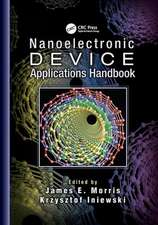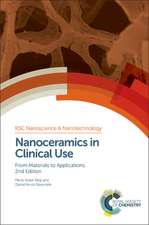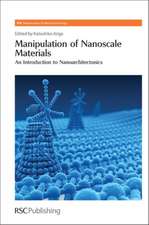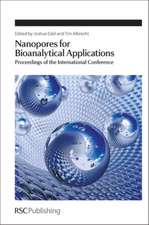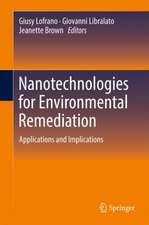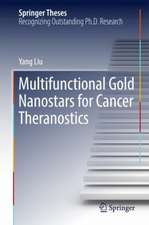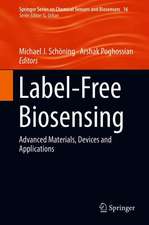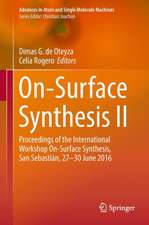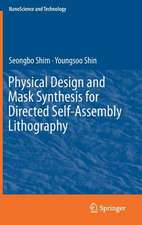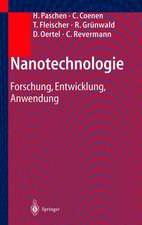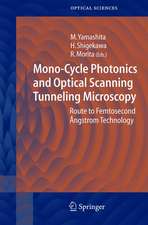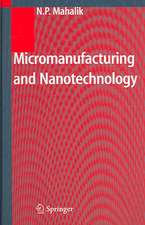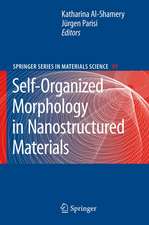Physics of Quantum Rings: NanoScience and Technology
Editat de Vladimir M. Fominen Limba Engleză Paperback – 25 aug 2015
| Toate formatele și edițiile | Preț | Express |
|---|---|---|
| Paperback (2) | 701.41 lei 38-45 zile | |
| Springer – 25 aug 2015 | 701.41 lei 38-45 zile | |
| Springer International Publishing – 19 ian 2019 | 1122.72 lei 6-8 săpt. | |
| Hardback (2) | 655.60 lei 3-5 săpt. | |
| Springer Berlin, Heidelberg – 10 sep 2013 | 655.60 lei 3-5 săpt. | |
| Springer International Publishing – 12 sep 2018 | 1129.02 lei 6-8 săpt. |
Din seria NanoScience and Technology
- 24%
 Preț: 905.79 lei
Preț: 905.79 lei - 18%
 Preț: 1123.35 lei
Preț: 1123.35 lei - 18%
 Preț: 964.71 lei
Preț: 964.71 lei - 18%
 Preț: 1121.76 lei
Preț: 1121.76 lei - 15%
 Preț: 655.60 lei
Preț: 655.60 lei - 18%
 Preț: 1390.11 lei
Preț: 1390.11 lei - 18%
 Preț: 954.31 lei
Preț: 954.31 lei - 15%
 Preț: 645.79 lei
Preț: 645.79 lei - 18%
 Preț: 953.03 lei
Preț: 953.03 lei - 18%
 Preț: 945.79 lei
Preț: 945.79 lei - 15%
 Preț: 639.90 lei
Preț: 639.90 lei - 18%
 Preț: 1109.16 lei
Preț: 1109.16 lei - 23%
 Preț: 779.87 lei
Preț: 779.87 lei - 18%
 Preț: 944.99 lei
Preț: 944.99 lei - 18%
 Preț: 957.62 lei
Preț: 957.62 lei - 18%
 Preț: 971.01 lei
Preț: 971.01 lei - 18%
 Preț: 1232.26 lei
Preț: 1232.26 lei - 18%
 Preț: 960.30 lei
Preț: 960.30 lei - 15%
 Preț: 646.62 lei
Preț: 646.62 lei - 18%
 Preț: 1249.31 lei
Preț: 1249.31 lei - 15%
 Preț: 636.80 lei
Preț: 636.80 lei - 18%
 Preț: 1232.26 lei
Preț: 1232.26 lei - 24%
 Preț: 821.43 lei
Preț: 821.43 lei - 18%
 Preț: 948.92 lei
Preț: 948.92 lei - 24%
 Preț: 1827.89 lei
Preț: 1827.89 lei - 18%
 Preț: 951.91 lei
Preț: 951.91 lei - 24%
 Preț: 794.21 lei
Preț: 794.21 lei - 18%
 Preț: 953.03 lei
Preț: 953.03 lei - 23%
 Preț: 782.55 lei
Preț: 782.55 lei - 18%
 Preț: 952.57 lei
Preț: 952.57 lei - 18%
 Preț: 948.16 lei
Preț: 948.16 lei - 18%
 Preț: 954.93 lei
Preț: 954.93 lei - 24%
 Preț: 809.40 lei
Preț: 809.40 lei - 23%
 Preț: 781.25 lei
Preț: 781.25 lei - 18%
 Preț: 954.93 lei
Preț: 954.93 lei - 18%
 Preț: 1830.34 lei
Preț: 1830.34 lei - 15%
 Preț: 641.71 lei
Preț: 641.71 lei - 18%
 Preț: 1228.96 lei
Preț: 1228.96 lei - 18%
 Preț: 1120.37 lei
Preț: 1120.37 lei - 18%
 Preț: 956.81 lei
Preț: 956.81 lei - 15%
 Preț: 592.59 lei
Preț: 592.59 lei - 18%
 Preț: 953.65 lei
Preț: 953.65 lei - 18%
 Preț: 954.62 lei
Preț: 954.62 lei - 18%
 Preț: 955.25 lei
Preț: 955.25 lei - 18%
 Preț: 959.19 lei
Preț: 959.19 lei - 18%
 Preț: 953.35 lei
Preț: 953.35 lei - 18%
 Preț: 786.84 lei
Preț: 786.84 lei
Preț: 701.41 lei
Preț vechi: 922.91 lei
-24% Nou
Puncte Express: 1052
Preț estimativ în valută:
134.22€ • 143.52$ • 111.91£
134.22€ • 143.52$ • 111.91£
Carte tipărită la comandă
Livrare economică 14-21 aprilie
Preluare comenzi: 021 569.72.76
Specificații
ISBN-13: 9783642438431
ISBN-10: 3642438431
Pagini: 487
Dimensiuni: 155 x 235 x 26 mm
Greutate: 0.72 kg
Ediția:Softcover reprint of the original 1st ed. 2014
Editura: Springer
Colecția Springer
Seria NanoScience and Technology
Locul publicării:Berlin, Heidelberg, Germany
ISBN-10: 3642438431
Pagini: 487
Dimensiuni: 155 x 235 x 26 mm
Greutate: 0.72 kg
Ediția:Softcover reprint of the original 1st ed. 2014
Editura: Springer
Colecția Springer
Seria NanoScience and Technology
Locul publicării:Berlin, Heidelberg, Germany
Cuprins
Preface.-
Quantum
Ring:
A
Unique
Playground
for
the
Quantum-Mechanical
Paradigm.-
Fabrication,
Characterization
and
Physical
Properties.-
Growth
and
Spectroscopy
of
Semiconductor
Quantum
Rings.-
Quantum
Rings:
Fabrication
and
Optical
Properties.-
Self-organized
Quantum
Rings:
Physical
Characterization
and
Theoretical
Modeling.-
Scanning-probe
Electronic
Imaging
of
Lithographically
Patterned
Quantum
Rings.-
Self-organized
Formation
and
XSTM-Characterization
of
GaSb/GaAs
Quantum
Rings.-
Self-assembled
Semiconductor
Quantum
Rings
Complexes
by
Droplet
Epitaxy:
Growth
and
Physical
Properties.-
Aharonov-Bohm
Effect
for
Excitons.-
New
Versions
of
the
Aharonov-Bohm
Effect
in
Quantum
Rings.-
Aharonov-Bohm
Effect
for
Neutral
Exctions
in
Quantum
Rings.-
Optical
Aharonov-Bohm
Effect
in
Type-II
Quantum
Dots.-
Theory.-
Strained
Quantum
Rings.-
Theoretical
Modeling
of
Electronic
and
Optical
Properties
of
Semiconductor
Quantum
Rings.-
Coulomb
Interaction
in
Finite-Width
Quantum
Rings.
Differential
Geometry
Applied
to
Rings
and
Möbius
Nanostructures.-
Hole
Mixing
in
Semiconductor
Quantum
Rings.-
Engineering
of
Electron
States
and
Spin
Relaxation
in
Quantum
Rings
and
Quantum
Dot-Ring
Nanostructures.
Recenzii
“Offers extensive material for scientists and upper-level students who wish to familiarize themselves with the subject in great breadth and depth, showing that, beyond points, lines and surfaces, there is still "a lot of room at the bottom".” (Translated from German, Prof. Dr. Axel Lorke, pro-physik.de, September 2019)
Notă biografică
Professor Vladimir M. Fomin develops theory of strain-induced nano-architectures, in particular, physical properties of self-assembled nano- and microstructures (quantum rings, rolled-up semiconductor and superconductor membranes, superlattices of quantum dots) at the Institute for Integrative Nanosciences (IIN), Leibniz Institute for Solid State and Materials Research (IFW), Dresden, Germany (since 2009). He made his doctoral studies in Kishinev at the Department of Theoretical Physics of the State University of Moldova and received the Ph.D.degree in theoretical physics in 1978. Since then he worked in the Laboratory “Physics of Multi-Layer Structures” at the State University of Moldova. His research interests embraced non-linear optical properties and transport due to the charge-vibration interaction in semiconductors and in multi-layer structures, including derivation of the phonon spectra and the electron-phonon interaction; classification of polaritons and phonons; platonic, bipolaronic and excitonic effects in arbitrary multi-layer structures. He won a State Prize of Moldova in 1987. He received the degree of Dr. habilitat in physical and mathematical sciences from the Academy of Sciences of Moldova in 1991. He is a University Professor in Theoretical Physics (State University of Moldova, since 1995). As a Research Fellow of the Alexander von Humboldt Foundation he worked at the Martin-Luther-University of Halle-Wittenberg (1993–1994). He was associated with the Laboratory Theoretical Solid State Physics (TFVS) (University of Antwerp, 1995–2008) and with the Group Photonics and Semiconductor Nanophysics and COBRA Inter-University Research Institute (Eindhoven University of Technology, 1998–1999, 2003–2007), Division Quantum and Physical Chemistry (Catholic University of Leuven, 2008) and Faculty of Physics and Center for Nanointegration (CeNIDE) (University of Duisburg-Essen, Duisburg, 2009-2009). He received a Diploma of a Scientific Discovery of the Phenomenon of the Propagation of Spatially-Extended Interface Phonon Polaritons in Composite Superlattices from the Academy of Natural Sciences of Russia (1999). He was bestowed a medal “Academician P. L. Kapitsa” by the Academy of Natural Sciences of Russia (2000). In 2007 he was elected a Honorary Member of the Academy of Sciences of Moldova. In 2011, he edited a special issue on Modern Advancements in Experimental and Theoretical Physics of Quantum Rings of the Journal of Nanoelectronics and Optoelectronics. His present scientific directions cover diversified fields in physics of nanostructures: optical properties of quantum dots, persistent currents and magnetization of quantum rings; phase boundaries and vortex matter in meso-, nanoscopic and patterned superconductors; superconducting properties of metallic nanograins; surface-induced magnetic anisotropy in mesoscopic systems of dilute magnetic alloys; quantum transport in sub-0.1 micron semiconductor devices; vibrational excitations and polaronic effects in nanostructures; thermoelectric properties of semiconductor nanostructures. 2 monographs, 3 textbooks, 7 reviews, 10 patents, 169 scientific articles and 277 conference presentations (including 39 invited).
Textul de pe ultima copertă
This book, now in its second edition, introduces readers to quantum rings as a special class of modern high-tech material structures at the nanoscale. It deals, in particular, with their formation by means of molecular beam epitaxy and droplet epitaxy of semiconductors, and their topology-driven electronic, optical and magnetic properties. A highly complex theoretical model is developed to adequately represent the specific features of quantum rings. The results presented here are intended to facilitate the development of low-cost high-performance electronic, spintronic, optoelectronic and information processing devices based on quantum rings.
This second edition includes both new and significantly revised chapters. It provides extensive information on recent advances in the physics of quantum rings related to the spin-orbit interaction and spin dynamics (spin interference in Rashba rings, tunable exciton topology on type II InAs/GaAsSb quantum nanostructures), the electron-phononinteraction in ring-like structures, quantum interference manifestations in novel materials (graphene nanoribbons, MoS2), and the effects of electrical field and THz radiation on the optical properties of quantum rings. The new edition also shares insights into the properties of various novel architectures, including coupled quantum ring-quantum dot chains and concentric quantum rings, topologic states of light in self-assembled ring-like cavities, and optical and plasmon m.odes in Möbius-shaped resonators.
This second edition includes both new and significantly revised chapters. It provides extensive information on recent advances in the physics of quantum rings related to the spin-orbit interaction and spin dynamics (spin interference in Rashba rings, tunable exciton topology on type II InAs/GaAsSb quantum nanostructures), the electron-phononinteraction in ring-like structures, quantum interference manifestations in novel materials (graphene nanoribbons, MoS2), and the effects of electrical field and THz radiation on the optical properties of quantum rings. The new edition also shares insights into the properties of various novel architectures, including coupled quantum ring-quantum dot chains and concentric quantum rings, topologic states of light in self-assembled ring-like cavities, and optical and plasmon m.odes in Möbius-shaped resonators.
Caracteristici
Presents the new class of materials of quantum rings Provides an elemental basis for low-cost high-performance devices promising for electronics, optoelectronics, spintronics and quantum information processing Explains the physical properties of quantum rings to cover a gap in scientific literature Presents the application of most advanced nanoengineering and nanocharacterization techniques Includes supplementary material: sn.pub/extras


